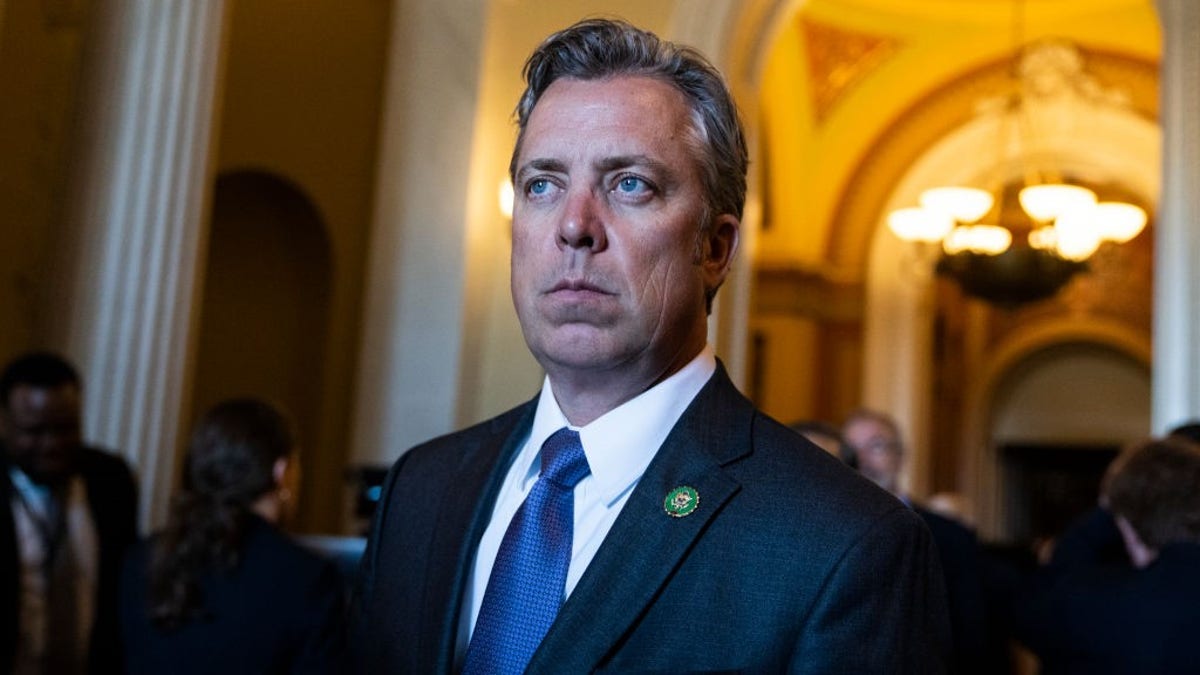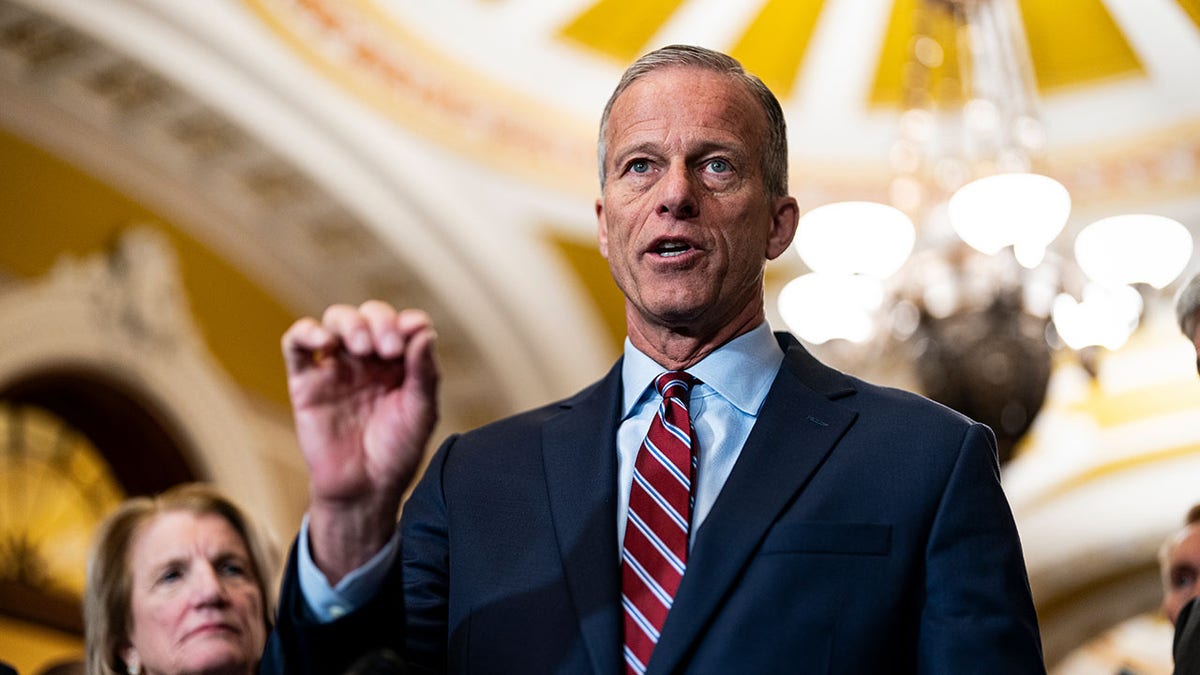INTERNACIONAL
Trump tax cuts survive key House hurdle as fiscal hawks threaten rebellion

Legislation setting the stage for Republicans to pass a broad swath of President Donald Trump’s agenda survived an important hurdle on Wednesday afternoon.
House GOP lawmakers voted to allow for debate on the legislation, known as a «rule vote,» a framework that serves as one of the first steps in the budget reconciliation process.
It’s still unclear whether House Republicans have enough support to pass the legislation itself, though GOP leaders have indicated they’re moving full steam ahead in a matter of hours.
«I think we can get this job done. I understand the holdouts. I mean, their concerns are real. They really want to have true budget cuts and to change the debt trajectory that the country is on,» Speaker Mike Johnson, R-La., told reporters ahead of the first vote..
HOUSE FREEDOM CAUCUS CHAIR URGES JOHNSON TO CHANGE COURSE ON SENATE VERSION OF TRUMP BUDGET BILL
President Donald Trump walks from the Oval Office to board Marine One on the South Lawn of the White House en route to Florida, Friday, March 28, 2025, in Washington. (AP Photo/Mark Schiefelbein)
Trump has directed Republicans to work on «one big, beautiful bill» to advance his agenda on border security, defense, energy and taxes.
Such a measure is largely only possible via the budget reconciliation process. Traditionally used when one party controls all three branches of government, reconciliation lowers the Senate’s threshold for passage of certain fiscal measures from 60 votes to 51. As a result, it has been used to pass broad policy changes in one or two massive pieces of legislation.
Rule votes are traditionally not indicators of a bill’s final passage, and they generally fall along party lines.
Several Republicans who voted to allow debate on the measure have said they will still oppose its final passage.
Passing frameworks in the House and Senate, which largely only include numbers indicating increases or decreases in funding, allows each chamber’s committees to then craft policy in line with those numbers under their specific jurisdictions.

Rep. Andy Ogles, R-Tenn., leaves the U.S. Capitol after the last votes of the week on Thursday, April 20, 2023. (Getty Images )
The House passed its own version of the reconciliation framework earlier this year, while the Senate passed an amended version last week. House GOP leaders now believe that voting on the Senate’s plan will allow Republicans to enter the next step of crafting policy.
But fiscal hawks have raised concerns about the differences in minimum mandatory spending cuts, which they hope will offset the cost of new federal investments and start a path to reducing the deficit.
The Senate’s version calls for at least $4 billion in spending cuts, while the House baseline begins at $1.5 trillion – a significant gap.
Conservatives have demanded extra guarantees from the Senate GOP that it is committed to pursuing deeper spending cuts in line with the House package.
«They don’t have a plan that I’ve seen. So until I see that, I’m a no,» Rep. Andy Ogles, R-Tenn., told Fox News Digital.
SENATE GOP PUSHES TRUMP BUDGET FRAMEWORK THROUGH AFTER MARATHON VOTE SERIES

Senate Majority Leader John Thune, a Republican from South Dakota, speaks during a news conference following the Senate Republican policy luncheon at the US Capitol in Washington on March 11, 2025 (Al Drago/Bloomberg via Getty Images)
CLICK HERE TO GET THE FOX NEWS APP
Trump himself worked to persuade holdouts both in a smaller-scale White House meeting on Tuesday and in public remarks at the National Republican Congressional Committee (NRCC).
He also fired off multiple Truth Social posts pushing House Republicans to support the measure, even as conservatives argue it would not go far enough in fulfilling Trump’s agenda.
«Republicans, it is more important now, than ever, that we pass THE ONE, BIG, BEAUTIFUL BILL. The USA will Soar like never before!!!» one of the posts read.
House Of Representatives,Republicans,House Budget,Donald Trump,Politics
INTERNACIONAL
Volodimir Zelenski insiste en reunirse con Vladimir Putin mientras Rusia intensifica los bombardeos en Ucrania

Contactos en Turquía
Qué se está negociando
Ataques con drones y bombas
INTERNACIONAL
Anti-ICE attackers revealed to have extensive history of radical protest activities

NEWYou can now listen to Fox News articles!
Some members of the group charged in the Prairieland Detention Center anti-ICE attack on Independence Day have been arrested in the past for protest activities.
Ines Soto, who is part of the group of ten charged with attempted murder of federal officers and firearm offenses, was arrested at a protest in 2016 for allegedly resisting arrest and trying to avoid detention, according to K-HOU 11 at the time.
The protest was against a speech by Richard Spencer at Texas A&M University. The outlet My Aggie Nation noted that Soto was 31 in 2016, which corroborates with a KERA News report stating that Soto is now 40 years old and was released on a $10,000 bond.
FBI CAPTURES FORMER MARINE CORPS RESERVIST ACCUSED OF SHOOTING AT ICE OFFICERS AT TEXAS DETENTION CENTER
Ten suspects were charged with attempted murder of a federal officer in connection with the July 4, 2025, ambush attack on the Prairieland Detention Center in Alvarado, Texas. (Johnson County Sheriff’s Office)
Meanwhile, KERA News reported that Savanna Batten partook in the Occupy Wall Street movement through an «Occupy Dallas» protest in 2011, where she was arrested for allegedly not allowing people to come and go from a Chase Bank. The case was ultimately dismissed, as a criminal trespassing charge was scrapped in exchange for 24 community service hours, the outlet reported.
Batten also specifically has a history of anti-ICE activism, as she was charged for allegedly blocking a highway in June 2018 near a Dallas ICE facility, and the charge for that was also dismissed in 2019 as part of a program.
Fox News Digital reported last week that Benjamin Song, who was captured by the FBI last week, had a known protest background. He was named in a 2023 lawsuit over a counter-protest to the New Columbia Movement at a drag brunch in Fort Worth, Texas. The lawsuit noted Song was tied with a pro-arms leftist group, the Elm Fork John Brown Gun Club.
UNEARTHED SOCIAL MEDIA POSTS EXPOSE RADICAL VIEWS OF ANTI-ICE SHOOTING SUSPECT CAPTURED BY FBI

During the Prairieland Detention Center attack, cars were vandalized with anti-ICE messages such as «Ice Pig.» (Justice Department)
In addition, he was also arrested in 2020 during a protest in Austin for allegedly assaulting a public servant, according to Fox 4.
Song’s social media profiles also indicated that he was extremely vocal online about his stances and activism, and also appeared to use a martial arts studio tied to his mother to film tactical exercises.
CLICK HERE FOR MORE IMMIGRATION COVERAGE
«Do you want to end mass shootings? Abolish the police,» he posted in June 2022 under the X handle, BubbleBreakBS.
Song, a former U.S. Marine Corps reservist, is accused of firing two AR-15-style rifles at two correctional officers and one Alvarado police officer, according to a criminal complaint obtained by Fox News Digital.
MORE DETAILS REVEALED ON SUSPECTS IN INDEPENDENCE DAY ICE ATTACK IN TEXAS

Savanna Batten (left) and Ines Soto (right) are both charged with attempted murder and firearms offenses in an anti-ICE Texas attack on July 4, 2025. (Johnson County Jail/)
«Make no mistake, this was not a peaceful protest,» Acting U.S. Attorney Nancy E. Larson said in a July 8 statement. «This was an ambush on federal and local law enforcement officers. This increasing trend of violence against law enforcement will not be tolerated in the Northern District of Texas. Those who use violence against law enforcement officers will be found and prosecuted using the toughest criminal statutes and penalties available.»
CLICK HERE TO GET THE FOX NEWS APP
A local police officer was shot in the neck by a suspect in the woods, according to the complaint. Another assailant allegedly fired dozens of rounds at unarmed correctional officers who had stepped outside the facility. Cars outside the facility were vandalized with «Ice pig» and «Traitor,» as authorities obtained anti-government literature from those involved, as well as a flag that said «Fight Fascism, Fight Oligarchy.»
Fox News Digital’s Greg Wehner and Stephen Sorace contributed to this report.
INTERNACIONAL
De “Hey Jude” a “Hotel California”: 40 letras de canciones que hicieron historia

Hay canciones que pasan a la historia, ya sea por su melodía, por las voces que las interpretan o sus letras. The Independent realizó un ranking de las 40 mejores letras de canciones en inglés de todos los tiempos. Bandas como Nirvana, The Beatles o Abba forman parte del listado. Según el ranking, las canciones se destacaron no solo por su música o interpretación, sino también por la fuerza de sus palabras, capaces de dejar una huella en distintas generaciones.
La lista está encabezada por ‘All Apologies’ de Nirvana. El tema está incluido en el álbum In Utero de 1993. Cobain escribió esta canción dirigiéndose tanto a Courtney Love como a su hija, Frances Bean. Para muchos, este track logra transmitir con especial nitidez el malestar interno y la rabia del músico, a la vez que se entrelaza con una profunda declaración de amor hacia su familia.
Según The Independent, el mensaje contenido en esta canción supera la tragedia personal de Cobain y subraya la permanencia del afecto más allá de la ausencia física. Apenas seis meses después del lanzamiento, el artista se quitó la vida y dejó atrás de sí un tema que muchos consideran imprescindible para comprender el significado de su legado artístico.
El listado continúa con Nine Inch Nails, ‘Hurt’. El tema, escrito e interpretado por Trent Reznor, hace un retrato directo de la autodestrucción y el sufrimiento, elementos presentes desde la primera grabación. Si bien Reznor nunca precisó si el trasfondo hace referencia al consumo de heroína, el texto y la atmósfera de la canción transmiten una carga emotiva que oscila entre el dolor y una poesía sombría.
Joy Division con su hit ‘Love Will Tear Us Apart’ da continuidad al ranking. “¿Por qué el dormitorio está tan frío volteado de tu lado?, ¿Mi sincronización es tan imperfecta, nuestro respeto se ha agotado?“, cita la letra. El sencillo, escrito por Ian Curtis, refleja matices de su propia experiencia personal, marcada por la crisis matrimonial y una inminente tragedia.
La canción sobresale por una combinación de melodía vibrante y una lírica de gran vulnerabilidad. La composición no transmite un mensaje sombrío en sí mismo, sino que transforma su tristeza en una pieza conmovedora, donde la humanidad del autor adquiere toda su dimensión.
Arcade Fire, ‘Sprawl II Mountains Beyond Mountains’ continúa la lista. Junto a la voz de Régine Chassagne, la canción aporta una atmósfera única. La melodía logra materializar emociones latentes y anhelos de escapar de la uniformidad.
El ranking, presentado por The Independent, sigue con Beyoncé, ‘Formation’; Laura Marling, ‘Ghosts’; LCD Soundsystem, ‘Losing My Edge’; Leonard Cohen, ‘So Long, Marianne’; The Libertines, ‘Can’t Stand Me Now’; Kate Bush, ‘Cloudbusting’; Nick Cave, ‘Into My Arms’; The Sisters of Mercy, ‘This Corrosion’ y Sultans of Ping FC con ‘Where’s Me Jumper?’
Seguidamente, el medio español posicionó entre los mejores temas a ‘There Is a Light That Never Goes Out’, de The Smiths; ‘I’m On Fire’ de Bruce Springsteen; ‘Father Lucifer’ de Tori Amos; ‘Black Steel in the Hour of Chaos’ de Public Enemy y ‘Pools (Drank)’ de Kendrick Lamar.
Mientras la comunidad afroamericana afrontaba las consecuencias de políticas conservadoras, Prince decidió abordar en su tema principal cuestiones como la violencia asociada a las pandillas, la pandemia del sida, tensiones políticas y catástrofes naturales. Con este enfoque, el cantante dejó atrás su aislamiento creativo y presentó ‘Sign O ‘The Times’, una canción donde la reflexión social y el comentario sobre realidades urgentes pasaron a primer plano.
En el listado no podían faltar los Rolling Stones. Si bien tienen grandes letras, en ‘Gimme Shelter’ recrean la atmósfera de inestabilidad y amenaza constante de la época. La composición captura el miedo y la incertidumbre de una sociedad al borde de la ruptura. Asimismo consolida el legado de Mick Jagger, Keith Richards y sus compañeros como cronistas musicales de un periodo turbulento.
Si de turbulencias se trata, David Bowie es uno de los artistas que, durante su vida, atravesó momentos turbulentos. Estos periodos fueron de gran inspiración para el músico a la hora de componer. ‘Station to Station’ es una de las canciones grabadas en los días más oscuros de Bowie. El músico lidiaba con su adicción a las drogas en Los Ángeles mientras buscaba refugio en las letras.
El ranking continúa con ‘Supersonic’, de Oasis; ‘Born Slippy’ de Underworld; ‘Landslide’ de Fleetwood Mac; ‘Graceland’ de Paul Simon; ‘Take a Walk on the Wild Side’ de Lou Reed; ‘Every Time the Sun Comes Up’, de Sharon Van Etten; ‘Gloria’ de Patti Smith; y ‘Hotel California’ de Eagles.

Thin Lizzy sigue el listado con ‘The Boys are Back in Town’. Le sigue Nina Simone con ‘Four Women’; St. Vincent ‘Digital Witnesses’; Frank Ocean con ‘Pink + White’. El ranking continúa con ‘Dinner at Eight’ de Rufus Wainwright; ‘It’s Alright Ma’’ de Bob Dylan; ‘The Winner Takes it All’ de Abba y ‘I Wanna Be Adored’ de The Stone Roses.
En los tres últimos puestos se encuentran ‘The World is Yours’ de Nas; ‘When I’m Sixty Four’ de The Beatles y Beck con ‘Loser’. Este último es uno de los éxitos más recordados de Beck. Surgió a partir de una autocrítica espontánea después de escuchar una versión preliminar del tema. El propio músico reconoció sentirse «el peor rapero del mundo» y se definió como “un perdedor”.
Esta percepción no solo alimentó el concepto de la canción, sino que inspiró el famoso estribillo que acabó identificando al tema. A pesar de la aparente falta de coherencia en la letra, la composición logra crear una atmósfera singular gracias a su escritura en flujo de conciencia, un recurso que genera magnetismo incluso en lo absurdo.

 POLITICA3 días ago
POLITICA3 días agoJuan Carlos Maqueda defendió la condena contra Cristina Kirchner: “Hay una sensación de que se hizo Justicia y que no hay impunidad”

 POLITICA2 días ago
POLITICA2 días agoExpulsada del Gobierno, Victoria Villarruel empieza a tomar distancia, pero no tiene proyecto político para este año

 POLITICA2 días ago
POLITICA2 días agoLa CGT evalúa adelantar a octubre el recambio de sus autoridades y define una movilización contra Milei



































